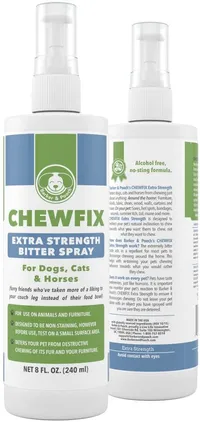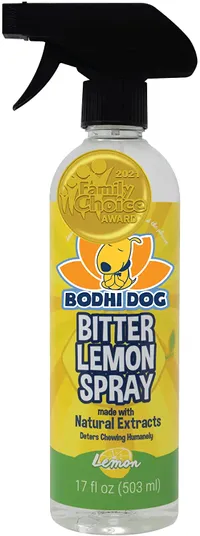Dog chew deterrents: What are they, do they work and are they harmful?
What are dog chew deterrents? We explore how effective they are and whether they pose any risks to your pup

When your dog is chewing the carpet, or anything he shouldn’t be, it’s natural to seek out dog chew deterrents. It sounds better than having your furniture chewed to pieces or your favorite pair of jeans torn to shreds. And if your dog is chewing on electrical wiring, well dog chew deterrents may just save their life!
While you may get away with distraction tactics, such as handing a dog the best long lasting dog chews, sometimes dog chew deterrents seem the only option. But is that the case? Can they actually harm your dog or, at the very least, confuse them? It’s always worth bearing in mind that puppies are natural chewers and that they need to explore their world with their mouth.
At the same time, however, if that chewing continues for too long or becomes overly destructive, action is needed. As well as working out ways to prevent a dog becoming bored, stressed or anxious, you may find that you don’t have much of a choice. If you’re pulling your hair out over how to stop your dog from chewing the carpet, and you've exhausted all the other ways to protect furniture from pets and the best dog chew toys fail to offer distraction, a dog chew deterrent might be just the ticket.
How do dog anti chew sprays work?
Quite simply, these sprays stink. They let off a smell that dogs don’t like and the idea is that, by applying bitter or strong scents to an object, a lot of dogs will avoid it. The key is to check that a spray is non-toxic and safe. Most use natural ingredients but some use strong chemicals and they may not be good for sensitive or allergic dogs.
Do dog chews deterrent sprays work?
We can’t say yes and we can’t say no so we have to sit on the fence with this question. Different dogs respond to different smells in different ways. In some cases, a dog may actually love the scent and chew more. You won’t know unless you experiment with a few different smells.
Some puppies will even still chew on their favorite objects despite the horrible smell – their need to chew overcoming the bitter taste or scent. In these cases it's a case of constant supervision, gating off areas so they can't get at what they want to chew and behavioral training.
How to use dog chew deterrents

Don’t spray in plain sight of your dog. They’re not daft. They’ll suddenly find your slippers don't taste very nice and associate the smell with something you are doing. Instead, be sneaky and start small: try one item first and see how your pup gets on. Check their reaction and make sure it’s not adverse. You don’t want to cause too much discomfort.
Get the best advice, tips and top tech for your beloved Pets
If your dog doesn't seem to be affected by the smell, or even seems more interested in the sprayed item, don't give up straight away. Try applying the spray more liberally in case the original application was just too dilute to deter them. Most sprays advise that the effect isn't instant and may take up to two weeks to have the desired effect. Also remember sprays wear off after time, so ensure you spray the items regularly.
How not to use dog chew deterrents
It goes without saying: never spray the dog in the face as a warning – it should not be used as a punishment. And don’t spray yourself even if your puppy is using your arm as a chew toy. Puppy biting is natural, and you want to build a bond with your dog. Learn how to stop a puppy biting not to bite instead.
Do not spray everywhere either: choose specific places and objects, otherwise your dog will not associate the smell as a warning, just a horrible background scent they have to put up with. rays.
Best dog anti-chew sprays to buy
Here are a few suggestions for some recommended dog chew deterrent sprays. These sprays are non-toxic but always keep them away from the eyes and nose.
Chewfix Extra Strength Bitter Spray | Amazon
This boasts one of the strongest smelling dog repellents ever discovered so you don't need a lot to keep your pup away from your slippers! Be warned though, humans can find it bitter too – so it may not be the best thing to spray on your couch. However, it's great for keeping your fur babies away from electrical wires and table legs.
Bodhi Dog Bitter Lemon Spray | Amazon
Recommended by trainers and vets as a humane way to keep constant chewers at bay. 100% non-toxic and made with natural extracts to provide the bitter taste, this is one spray you can be happy to put around your home. It's also good for pets with allergies or other sensitivities to strong chemicals.
Grannick's Bitter Apple for Dogs | Amazon
This non-toxic and safe spray has had some reported good results in keeping furry friends away from precious furniture and fittings. It is made from water, isopropanol (20%), bitter principles, and extracts. Some users have found that the spray doesn't last that long, but regular application of the spray in places you don't want your pup to chew should help deter them.
Jamie Middleton is a freelance editor and writer who has been editing and creating content for magazines and websites for over 20 years. As well as writing about the pets he loves, he has helped create websites about tech and innovation like TechRadar.com, Innovate UK and TechSPARK, written programmes for music festivals, books on inventions and architecture, TV listings magazines, and edited publications about cars such as Lexus, Toyota and Jaguar. In his spare time he writes fiction books and poetry - or at least he does when he is permitted to by his cat Pirate, who enjoys the warmth of laptops too much to allow being creative to get in the way.
- David CrookesFreelance writer




